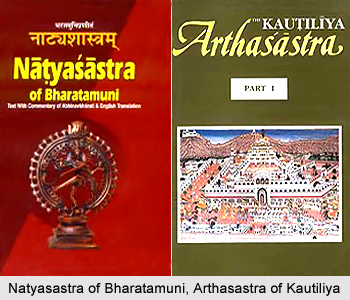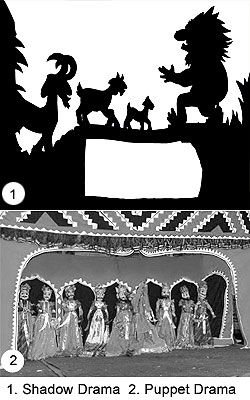 Dramas since time immemorial have occupied an important place in the Sanskrit Literature. These dramas composed by notable playwrights and dramatists were not only written for literary creation but also for enactment on the stage. According to many scholars. Indian plays evolved on the Indian soil itself. In the Vedas one can find all the ingredients of drama like song, dance, dialogue and acting as well. The science of stage-craft was, however, fully developed by the time of Chanakya`s Arthashastra and the Indian drama attained its full form by the time of Patanjali.
Dramas since time immemorial have occupied an important place in the Sanskrit Literature. These dramas composed by notable playwrights and dramatists were not only written for literary creation but also for enactment on the stage. According to many scholars. Indian plays evolved on the Indian soil itself. In the Vedas one can find all the ingredients of drama like song, dance, dialogue and acting as well. The science of stage-craft was, however, fully developed by the time of Chanakya`s Arthashastra and the Indian drama attained its full form by the time of Patanjali.
History of Ancient Indian Drama
Bharata in the Natyasastra has given a complete account of the origin of the Indian drama. According to legend Lord Brahma was requested by the gods to produce something to play that could be seen and also heard and even the people to different castes could benefit from it. Thus Brahma took recitation i.e. Pathya from the Rig Veda, song i.e. gita from the Sama Veda, the art of action i.e. abhinaya from the Yajur Veda, and lastly sentiment i.e. rasa from the Atharva Veda. He finally created the new Natyaveda. Brahma then requested Bharat Muni to bring into practices the precepts with the help of his sons and disciples, and the gandharvas and apsaras, as the actors and actresses, during the `banner festival of Indra`.
 The Abhinayadarpana also records this tradition of Bharata receiving the Natyaveda from Brahma. It further mentions that Bharata, along with the group of gandharvas and apsaras performed natya, nritta and nritya before Lord Shiva and through his grace received the knowledge of lasya and tandava.
The Abhinayadarpana also records this tradition of Bharata receiving the Natyaveda from Brahma. It further mentions that Bharata, along with the group of gandharvas and apsaras performed natya, nritta and nritya before Lord Shiva and through his grace received the knowledge of lasya and tandava.
The Bhavaprakasana also records two accounts with regard to the origin of the Natyaveda. According to the first account Maheshvara first created Lord Brahma and Lord Vishnu and then Nandikesvara taught the Natyaveda to Brahma. From Brahma the knowledge was passed on to Bharat Muni who enacted it and the Tripura-daha rupaka was played. According to the second account the Natyaveda was taught to Brahma by Nandikesvara and from Brahma it was preached to Bharata. Suryadeva, thus asked Manu to pray to Brahma for relief from trouble and Bharata was sent with him to Bharatavarsa.
There are many instants that point out the religious origin of the drama. The legend of Lord Krishna provided ample material for the drama. It is this popularity of the legend that the Yatras remained to be popular and have survived the decadence of the regular Sanskrit drama because they depict the love story of Krishna and Radha. Even Lord Shiva occupied a important place in the history of drama. The invention of tandava and the Lasya have been ascribed to him and his spouse respectively. The legend of Lord Rama had been equally important in the growth of drama.
Religious importance can also be seen in the Buddhist`s attitude towards the drama. The Lalitavistara records that the Lord Buddha had the knowledge of drama and he is said to have entered to gaze on the drama of the Great Law. According to a legend, even in Buddha`s time there was existence of dramas. Bimbisara had one performed in honour of a pair of Naga kings. The Avaddnasataka`, also refers to a tradition that the drama was performed by the bidding of Krakucchanda, a far distant Buddha in the city of SobhavatI by a troupe of actors.
Some scholars do not believe in the religious origin of the drama. They think that a popular mime existed, which, with the epic lies at the bottom of the Sanskrit drama. Music, song and dance that was popular in the Vedic period also continued during the later period. Many scholars are of the view that the puppet-play assumes the pre-existence of the drama. Even shadow-play was an essential element in the development of the Sanskrit drama. It is held that the Saubhikas of the Mahabhasya were persons who explained matters to the audience to supplement either dumb actor of shadow figures..
Dramas were enacted on special occasions. The Natyasastra, which records the, traditional account of the origin of drama, tells about that the practical exhibition of a drama named "Fall of Asuras." The drama was arranged on the occasion of the Indravaja festival. Abhinayadapana considers nattya and nritta on occasions like coronation, celebration by a king a festival, a procession with an image of a god, a marriage ceremony, reception of a friend entry into a new town or house and the birth of a son.




